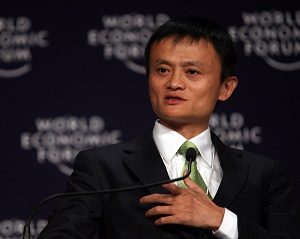 |
| Alibaba's Jack Ma |
SINGAPORE--Who knew that China FDA's planned lifting of a ban on online drug sales meant the global pharmaceutical industry could end up in a palace intrigue? This one pits China's richest man against the government in a power struggle involving China's version of Google ($GOOG), called Alibaba.
China authorities try to keep tight control on information available online; they completely block some material, mainly pornographic and geopolitical sites. On the eve of new online pharma sales, a wrestling match with Alibaba heated up and then calmed down, all in the course of two or three days.
In a country where anticorruption trials have preset outcomes and require the convicted to confess, Alibaba's Jack Ma has managed to face down a government official. Liu Hongliang, Internet regulator within the State Administration for Industry and Commerce (SAIC), apparently acted on his own to take the squabble public.
He took the rare step of posting on the agency's website a white paper lambasting Alibaba's search engine for various violations of consumer protections and corruption.
Just as mysteriously, the white paper and related postings were removed from the site a day later, and Hongliang's boss at SAIC, Xhang Mao, met privately with Ma in an apparent attempt to defuse the situation. All of this took place under the guise of allegations that Alibaba colluded to allow fake goods, which could include counterfeit drugs, to be sold via its search engine.
Immediately after the CFDA announced in mid-January that online drug sales would be allowed as soon as it could draw up regulations, Ma invested $1.6 billion in Guangzhou Baiyunshan Pharmaceutical. His intent was to help the firm expand distribution to boost its presence online, through various companies associated with Alibaba's search engine.
The CFDA had been expected to allow online drug sales by the end of January; there's no sign of the rules yet. The most recent relevant posting on its website was a 2010 circular announcing tighter restrictions on online sales of drug precursors.
 Accusations against Ma and company included corruption allegations involving employees who allowed fake items to be sold online. Also posted along with the white paper was the SAIC Internet chief's report on a meeting of his panel with Alibaba officials last July. It's apparently the only publicly available document related to the squabble because a business news site, Quartz, posted a translated version before the material was removed from SAIC's official site.
Accusations against Ma and company included corruption allegations involving employees who allowed fake items to be sold online. Also posted along with the white paper was the SAIC Internet chief's report on a meeting of his panel with Alibaba officials last July. It's apparently the only publicly available document related to the squabble because a business news site, Quartz, posted a translated version before the material was removed from SAIC's official site.
That brings the drug industry full circle to the beginning of China's major policy of cracking down on corruption under its new leadership. The crackdown took off big by going after a major global drugmaker, the U.K.'s GlaxoSmithKline ($GSK) in July of 2013, in a case that rocked Western drug firms. And then came other actions against pharma companies until the crackdown shifted to other industries. But the message was clear to the multinational drug firms. Could the past be prologue for online drug sales?
- here's the Quartz report
- and the SAIC website (in Chinese)